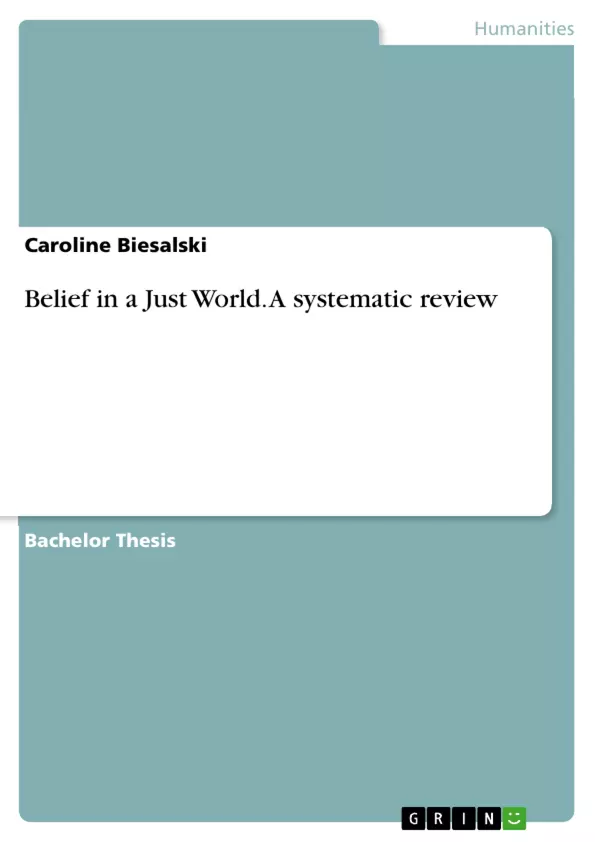Just World Belief (JWB) is a cognitive belief of people that assumes that actions have morally just and appropriate consequences for the actor. This theory has been widely researched in the literature, with a focus on negative social effects and positive psychological effects. In particular, the subjective experience of justice seems to be relevant, since experienced in-justice can have devastating consequences on an individual level (depression, aggression, et cetera) as well as on a group or societal level (conflicts, protests, et cetera). Accordingly, JWB theory is an interesting approach to the study and explanation of social behaviour in groups and societies. Presented here is a systematic literature review of current studies on the causes and effects of JWB in order to identify the current state of scientific knowledge and relevant trends, and to uncover potential interesting avenues of inquiry for the future. To this end, following a brief presentation of the theoretical background, a systematic literature review and analysis will be conducted and its results presented and discussed.
Table of Contents
- 1. Introduction
- 2. Basic terms
- 2.1. Justice
- 2.1.1. Belief
- 2.2. Just World Belief
- 2.2.1. Classification
- 2.2.2. Concept
- 2.2.3. Rationale for the research question
- 3. Method
- 3.1. On the method
- 3.1.1. The systematic literature search
- 3.1.2. Structure of the systematic literature search
- 3.2. Procedure
- 3.2.1. Concretization of the topic and the research question
- 3.2.2. Selection of databases and search terms
- 3.2.3. Determination of the inclusion and exclusion criteria
- 3.1. On the method
- 4. Results
- 4.1. Data collection
- 4.2. Analysis of results
- 4.2.1. Development of Just World Belief
- 4.2.2. Capture of Just World Belief
- 4.2.3. Effects of Just World Belief
- 4.2.4. Personal and general Just World Belief
- 5. Discussion
- 5.1. Evaluation
- 5.1.1. Evaluation of the scientificity of the method
- 5.1.2. Evaluation of the quality of the results
- 5.2. Main research strands and results
- 5.3. Limitations of the results
- 5.1. Evaluation
- Outlook
Objectives and Key Themes
This Bachelor thesis aims to conduct a systematic review of the literature on Belief in a Just World. The study explores the concept, measurement, and effects of this belief.
- Definition and conceptualization of Belief in a Just World
- Methods for measuring Belief in a Just World
- Empirical findings on the effects of Belief in a Just World
- Strengths and limitations of existing research
- Future research directions
Chapter Summaries
Chapter 1: Introduction provides a brief overview of the topic and research question.
Chapter 2: Basic terms defines key concepts such as justice and Belief in a Just World, outlining its classification and rationale for the research question.
Chapter 3: Method details the systematic literature search strategy, including database selection, search terms, and inclusion/exclusion criteria. It describes the procedures followed in the review.
Chapter 4: Results presents the data collection and analysis of the reviewed studies, focusing on the development, measurement, and effects of Belief in a Just World, including distinctions between personal and general beliefs.
Chapter 5: Discussion (excluding conclusion) evaluates the scientific rigor of the methodology and the quality of the results obtained, highlighting main research strands and identifying limitations of the findings.
Chapter 5: Outlook This section is omitted to avoid spoilers.
Keywords
Belief in a Just World, systematic review, justice, methodology, empirical research, literature analysis, measurement, effects.
- Citation du texte
- Caroline Biesalski (Auteur), 2022, Belief in a Just World. A systematic review, Munich, GRIN Verlag, https://www.grin.com/document/1499699



